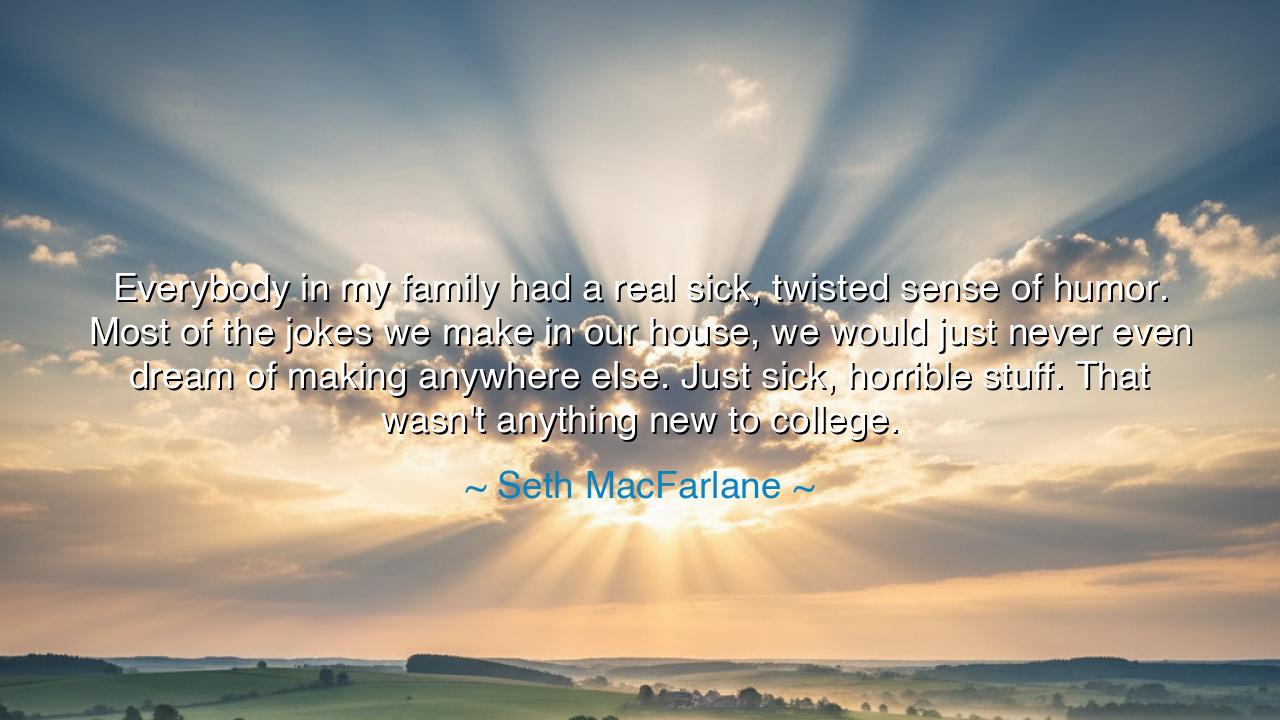
Everybody in my family had a real sick, twisted sense of humor.
Everybody in my family had a real sick, twisted sense of humor. Most of the jokes we make in our house, we would just never even dream of making anywhere else. Just sick, horrible stuff. That wasn't anything new to college.






In the words of Seth MacFarlane, “Everybody in my family had a real sick, twisted sense of humor. Most of the jokes we make in our house, we would just never even dream of making anywhere else. Just sick, horrible stuff. That wasn’t anything new to college.”
Though spoken with levity, these words hold within them a profound reflection on the nature of humor, family, and the human need to laugh at what frightens or wounds us. MacFarlane — the creator of sharp, often controversial satire — here reveals not a boast, but a truth about the ancient and enduring power of private laughter. The home, he suggests, is the sanctuary where even the darkest jest finds forgiveness, where humor becomes not cruelty, but connection — a sacred shield against the absurdity and pain of existence.
The “sick, twisted sense of humor” he describes is not the sickness of malice, but the rebellion of the spirit against fear. In every age, there have been those who laugh at what others dare not name — not because they despise life, but because they love it too fiercely to let sorrow conquer it. To joke about darkness is to strip it of its fangs. Within his family’s walls, laughter was not a polite performance but an act of freedom — the laughter of those who understand that even horror, when seen through the lens of humor, loses some of its power to wound. What he calls “horrible stuff” is, in truth, a ritual of survival — the same ritual that has existed since humanity first gathered around firelight to tell stories of fear and folly.
The origin of such humor lies deep in the human psyche. It is the same laughter that echoed in the camps of soldiers before battle, the same laughter that rose among plague survivors who refused to surrender to despair. The ancients knew this power well. In the writings of Aristophanes, the great comic poet of Athens, even the gods were mocked, for he understood that irreverence is a form of strength. When the world grows unbearable, laughter becomes defiance. MacFarlane’s family, in their private jesting, carried forward this ancient inheritance — the laughter of those who dare to look at life’s darkness and say, “You do not own me.”
Yet there is another layer in his confession — the acknowledgment that what is sacred within the family’s circle may be misunderstood beyond it. “We would never even dream of making [those jokes] anywhere else,” he says, recognizing that context is the soul of humor. What binds in one place may divide in another; what heals one heart may wound another. This is the humility that separates cruelty from comedy — the understanding that humor, like fire, must be tended carefully. In this, MacFarlane shows wisdom: the family’s laughter was intimate, born of trust and shared history, not meant for a world that has forgotten the difference between mockery and meaning.
Consider the story of Voltaire, the French philosopher whose sharp wit challenged kings and priests alike. His satire was called blasphemous and cruel, yet behind his laughter burned a fierce compassion for truth. He used humor as a weapon against hypocrisy and tyranny, not against the weak, but against the powerful. Like MacFarlane’s family humor, Voltaire’s satire revealed that sometimes the only way to speak truth safely is through laughter. For laughter can say what anger cannot; it can expose without destroying, mock without malice, and heal without denial.
But there is danger, too, in the misused jest. Laughter without empathy becomes poison; wit without wisdom becomes cruelty. MacFarlane’s awareness of boundaries — that some jokes are sacred to the circle of trust — is a reminder that humor must be rooted in understanding. True laughter unites, not divides. The best humor, even when dark, carries a spark of love — the acknowledgment that life is ridiculous, fragile, and shared. To laugh together at pain is not to glorify it, but to transcend it.
Let this, then, be the lesson of his words: humor is both shield and mirror. It protects the soul from despair, and it reflects the truth of who we are. Do not fear the laughter that rises from sorrow; it is the soul’s rebellion against meaninglessness. But wield your humor wisely. Know where it heals and where it harms. Cherish those who can laugh with you, for shared laughter is the sign of trust, and trust is the foundation of love.
And so, dear listener, remember this: as Seth MacFarlane teaches, even the most twisted humor can spring from the purest place — the heart’s need to survive, to connect, to make light where there is none. Laugh bravely, but kindly. Speak truth through humor, but with compassion. For in laughter — even the dark, uncomfortable kind — lies one of the oldest and most human powers of all: the power to turn pain into strength, and fear into freedom.






AAdministratorAdministrator
Welcome, honored guests. Please leave a comment, we will respond soon